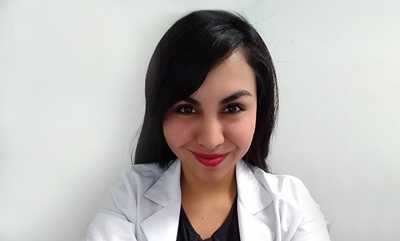‘I Realized That I Needed to Do More’.
 As a Spanish speaker from Mexico City, Emilia Chino expected to become immersed in the English language immediately when she arrived to the School of Public Health as an exchange student last fall.
As a Spanish speaker from Mexico City, Emilia Chino expected to become immersed in the English language immediately when she arrived to the School of Public Health as an exchange student last fall.
“But now that I am here, everyone wants to speak Spanish with me!” she says with amusement.
Chino is the second Mexican student to participate in the BU-INSP Exchange Program, the school’s reciprocal exchange student partnership with the School of Public Health of Mexico, housed at the National Institute of Public Health (INSP) in Cuernavaca, Mexico. Since the partnership began in 2015, 13 SPH students have traveled to Mexico through the Mexico Field Program to work on public health issues alongside INSP’s MPH students and in the Cuernavaca community. The SPH exchange program, which accepts up to two participants per semester, is the only formal program of its kind at the school.
Chino already had a solid background in health care when she arrived for the fall 2018 semester. As the first person in her family to study medicine, she received a medical degree at the Metropolitan Autonomous University in Mexico City and completed her residency in geriatrics. Now she is working as a geriatrician at the Mexican Social Security Institute and is set to complete her MPH program this spring.
Chino says she applied to the SPH exchange program to gain insight and tools on how to develop policies to improve healthcare access for the elderly in Mexico. Health resources for seniors—as well as specialized geriatric training for physicians—are limited in the country, and there is a wide gap between the needs of elderly Mexicans and the ability of the healthcare system to satisfy them.
She witnessed the magnitude and complexity of health concerns among all populations when she traveled to a rural area in Mexico for a medical school project, to identify potential cases of tuberculosis among community members with limited access to health care.
“I asked the first person, ‘Do you have a cough?’ and they said, ‘No, but I have this issue,’ and I had to tell them, ‘I’m sorry, but we can’t help with that issue,’” Chino says. “Then I asked the next person the same question and they also said, ‘No, but I have this problem.’
“This population had a lot of other health problems, such as malnutrition, cancer, and [dental] problems,” Chino says. “We felt so bad that we couldn’t help these people because our program was not designed for this population. That was when I realized the [scope] of public health and that I needed to do more.”
She said she observed a similar problem during her clinical practice at her university’s hospital, where children with chronic kidney disease were forced to receive dialysis treatment in cardboard boxes because there were no available beds to accommodate them.
“That broke my heart,” says Chino, who now conducts research on the quality of life of elderly patients who are battling the disease. “I thought, we shouldn’t allow that in this country.”
With these situations in mind, Chino enrolled in five classes at SPH: Fighting Corruption Through Accountability and Transparency, Obesity & Society, Healthcare Delivery Systems, Digital Disruption in Health, and Confronting Non-communicable Diseases in the Developing World. She also made sure to attend as many school events as possible to hear from experts on various health topics. One skill she gained was how to develop cogent health messaging that will resonate with policymakers.
“In Mexico, there is a gap between physicians’ and policymakers’ language,” she says. “The policymakers care about politics and strategies, and we care about reducing mortality.”
She once thought that nursing homes, which are limited in Mexico, could help improve elderly care in the country. But after discovering the complications and dissatisfaction of quality care for similar facilities in the US, Chino says she will consider other solutions—such as establishing family members as formal, paid caregivers, since most elderly patients rely primarily on relatives to care for them.
“I think it’s fantastic to have students in the class that come from another background,” says Veronika Wirtz, associate professor of global health and founder and co-chair of the exchange program, along with Senior Global Practicum Manager Joe Anzalone. “It enriches the class environment and makes it a much better learning environment.” Wirtz notes that the language proficiency requirement and Boston’s high cost of living are limiting factors for potential applicants, but she hopes the school will eventually be able to offer a scholarship to applicants and expand the program to other countries.
Chino says the language barrier was challenging at times, especially when class discussions included acronyms and political jargon, such as “EHR” [electronic health records] and “whistleblower.”
Aside from the academic experience, Chino says she especially appreciated the cultural diversity and emphasis on inclusion at SPH.
“I never had the experience of being involved in a huge community before,” she says. “I would get emails from the international community, the minority community, and the public health community, and I got really involved and didn’t feel like a stranger.”
Comments & Discussion
Boston University moderates comments to facilitate an informed, substantive, civil conversation. Abusive, profane, self-promotional, misleading, incoherent or off-topic comments will be rejected. Moderators are staffed during regular business hours (EST) and can only accept comments written in English. Statistics or facts must include a citation or a link to the citation.